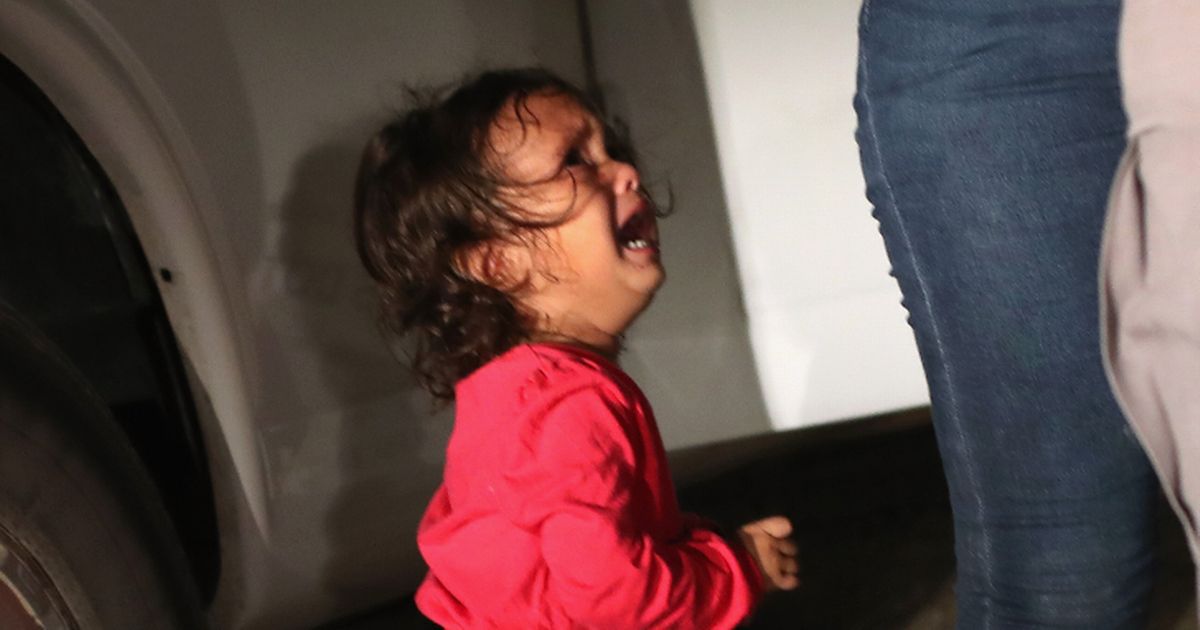I want to tell you a story. It is a story about a current national shame, uncertain theological commentary, and keeping a promise.
A National Shame and the Catholic Response
The headline was at the top of my news app: “Youngest migrants held in ‘tender age’ shelters.” I groaned a prayer as the descriptions and circumstances took shape into a mental picture. Chain link fences, concrete floors, toddlers crying and no one to hold them. Then I listened to the audio of an immigrant child calling out for his papá, which is exactly the way my kids say my name. Apparently, the audio was secretly recorded at one of the facilities where over 2300 children were forcibly separated from their immigrant parents. This has been happening since May, in an unprecedented way and as a direct result of the enactment of President Trump’s “zero-tolerance” policy toward undocumented immigrants crossing the US-Mexico border (see here if you’re still confused). Immigrant children, disabled and vulnerable persons, and asylum seekers are directly harmed by this policy…and there will be long term effects (see here, here, here, and here). Trump’s “zero-tolerance” policy was intended as a deterrent (see here, also here, here, and here)–meaning that the harm was intended, although the relevant research has shown that this strategy does not work (see here). There is no ambiguity that Donald Trump’s “zero-tolerance” policy was intentionally envisioned, implemented, and executed to have the effect we have seen.
The US Catholic Conference of Bishops decried the Trump policy, twice (see here and here; also here and here). Jeff Session’s vile invocation of Holy Scripture as justification for the Trump administration policies was roundly rejected, including in these remarks by Kelly Johnson (here) and an interview with New York’s Cardinal Timothy Dolan (here).The Academy of Catholic Hispanic Theologians in the US (ACHTUS) and the Black Catholic Theological Symposium issued a joint statement denouncing the Trump policy. Charlie Camosy wrote an appeal for the unity of the Christian outlook on life (here). These remarks by Bishop Daniel Flores, of Brownsville, point to the heart of the matter and issue a call to prayerful action. Archbishop Chaput, of Philadelphia, described the Trump policy as stupid and destructive. And the Holy Father Pope Francis condemned the practice of separating the children of migrant families at the border.
Across the country, the US Catholic Bishops have reaffirmed their teaching on migration and human dignity, articulated in Strangers No Longer: Together on the Journey of Hope and the five principles that the USCCB outlined to help guide the conscience of US Christians on matters of migration, immigration, national borders, human dignity, and human rights. All of this has stimulated fresh attention to nonpartisan and theologically rich Christian ministry efforts like the Share the Journey campaign, jointly sponsored by Catholic Charities USA, Catholic Relief Services, Caritas International, and the USCCB.
A vehement public outcry pressured Trump into signing an essentially symbolic executive order on June 20, 2018–symbolic insofar as there was no attached plan to reunite the currently separated families, the practice of imprisoning children with their undocumented immigrant parents has not been halted, the enactment of the executive order is contingent upon highly improbable actions from both congress and the courts, and no provision was made to reconcile Trump’s “zero-tolerance” policy with the Flores Settlement (1997, 2015) or the 2016 decision by the Ninth U.S. Circuit Court of Appeals. It has been reported that immigrant parents have been deported while their children remained in custody at US facilities. And, on June 25th, Trump began advocating for the elimination of due process for undocumented migrants held in US detention facilities.
Theological Commentary, Concentration Camps, and the Call to Mercy
I’m not a news junkie or an aficionado of American politics. Nevertheless, I’ve always tried to pay attention to the main currents of the national debate. As I see it, some degree of serious attention is integral to faithful citizenship for Catholics living in a representative democracy (see the USCCB’s “Forming Consciences for Faithful Citizenship: A Call to Political Responsibility“). Of course, paying attention to national politics these past two years has become a painful spiritual discipline and the exercise now burns with growing alarm at the deep damage Trump and his political enablers are wrecking upon our democratic institutions. In a recent post, Connor Kelly shares some worthwhile reflections on the Catholic moral witness in America and what may be at stake in our current political moment.
When I read the headline about ‘tender age’ shelters, it landed in a way that hit closer to home: I’m not inclined toward the work of news-cycle-driven theological commentary on political matters in the public square, but I am a father, a Catholic moralist, a Chicano theologian, and an American…one who believes, following St. Thomas, that “pious regard for kinfolk, fellow-citizen, and country” is a moral virtue (see Aquinas on “patriotism”). So, in the ordinary way, like any Catholic intellectual who has a conscience and who earns her or his daily bread by reading, writing, and teaching, I thought to myself “I need to do something…maybe I should write an article.” And I started thinking about the various half-finished remarks I have on migration, the natural law, hospitality, sanctuary, Christian discipleship, and Catholic social teaching.
Then I just felt overwhelmed. It would take me weeks to write a proper, theological reflection on these matters…and where do I send it? And even though the injustice and inhumanity is obvious and urgent, do I have anything to say that hasn’t already been said? Certainly the current public debate around our national immigration policy is animated, but the main Christian theological and moral principles are ancient and spring from the heart of the Gospels. So, since I have nothing new to say, perhaps I should write something on the burden of the moment. That is to say, among the most timely activities for a Christian theologian would seem to be to help Christians in America think and act like Christians (e.g., among the spiritual works of mercy, to instruct the ignorant and to council the doubtful; see my essay “The Call to Mercy: Veritatis Splendor and the Preferential Option for the Poor“). However, what would it take to sift through all the reporting and descriptions of these complex circumstances in a way that is scholarly and compelling to Christians who are not thinking and acting like Christians? And by the time I attained a solid grasp of all the relevant details and disagreements, the whole story will certainly have moved on and there would be even more to take into account. Furthermore, given that I’d be writing to change hearts and minds, would it even be possible to present the evidence in a way that wouldn’t immediately be rejected by Christians who are still confused about Trump? What difference could anything I write make?
As I thought about my limitations and various uncertainties, I recalled the adage (usually attributed to Burke) that has been haunting my theological imagination this past year:
The only thing necessary for the triumph of evil is for good men to do nothing.
Christians, of course, have faith that evil will not ultimately triumph, but that hope does not absolve us from a responsibility to act. The splendor of the truth that Christians proclaim is the perfection of love in truth called mercy (Veritatis Splendor, §§18b, 24; Caritas in Veritate, §5b). Properly understood as the love that overcomes evil with good, mercy “constitutes the fundamental content of the messianic message of Christ and the constitutive power of his mission” (Dives in Misericordia, §6e). In a world wounded by sin and the reality of evil, our most magnificent imitation of triune God is to participate in God’s merciful regard for the world (Libertatis Conscientia, §55). So, then, and more to the point, Proverbs 24:10-12 (NIV):
If you falter in a time of trouble,
how small is your strength!
Rescue those being led away to death;
hold back those staggering toward slaughter.
If you say, “But we knew nothing about this,”
does not he who weighs the heart perceive it?
Does not he who guards your life know it?
Will he not repay everyone according to what they have done?
Or, Matthew 25:14-30 and Ephesians 5:1-20.
Thinking through the lens of western history, when natural expressions of human dignity have been criminalized (like religious freedom, or ethnic distinctiveness, or freedom of conscience, or self-preservation, or the right to migration), how obvious was the evolution from “vilification” to “detention center” to “internment camp” to “concentration camp” to “death camp”? Were the steps of moral compromise ever obvious, uncomplicated, and uncontroversial for those who eventually found themselves defending tyrants? Have fascists and autocrates ever described their actions in anything less than the most glowing terms of piety, patriotism, rule of law, and honorable intent? It seems to me that the call to mercy, in a moment like ours, involves a reinvigorated love for the truth.
Keeping a Promise and Admitting Inadequacy
When I came upon the AP article about ‘tender age’ shelters, I was in our living room and I read excepts out loud for my wife. Then I saw that Trump had, once again, described undocumented migrants as vermin that “pour into and infest our country”. When my tween-aged daughter asked me why I was crying, I did my best to explain to her what was happening and I reminded her how faithful Catholics think about leaders like Donald Trump. Because my daughter has a conscience and understands the responsibilities that come with our social privilege, she said “We should do something.” I agreed and then admitted that I couldn’t think of a direct way for our family to help (there are certainly lots of indirect ways to help, of course…for Catholics, the Share the Journey campaign is a very good place to start). So, we came to an agreement and I made my daughter a promise.
My best understanding is that performance of any particular corporeal or spiritual work of mercy requires both competency and resources. For example, one cannot give food if there is none to give, a person who is immobile cannot visit the sick, a person who lacks a particular knowledge cannot teach what he does not know, etc. It happens that there are some works of mercy that a person cannot perform at certain times in his or her life, for reasons of competency or resources or circumstance. However, there is always some work of mercy that can be performed…patience, forgiveness, and prayer being among the most readily accessible.
My daughter and I sorted out some ways that we could help the migrant families indirectly (like voting, writing letters, public protest, and donation to trustworthy organizations). And we settled on some ways that we can help directly, given our ordinary limitations and family circumstances: She will pray for the families that are suffering and make sure she does not become insensitive to the injustice we see happening at the US/Mexico border–her prayer and attention are so that she will be ready to act with mercy when the opportunity comes. Acts of discipleship, devotion, and Christian mercy, it seems to me, are among the principal ends toward which authentic “thoughts and prayers” are ordered. The hypocrites who announce their prayers but do not act have received their reward. However, when Christians pray as the LORD taught us, action is always connected to prayer. So, my daughter agreed to pray and to pay attention, awaiting her turn to act; and I promised to write something about the children who have been separated from their parents. I admit that I don’t know how to write about these things and that this blog post is clumsy, inadequate, and hardly more than a gesture–but I don’t know what else I can do at the moment, and I need to do something.
Lord, have mercy on us.





Trackbacks/Pingbacks